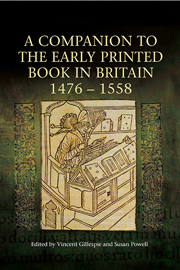Book contents
- Frontmatter
- Contents
- List of Illustrations
- List of Contributors
- Preface
- Acknowledgements
- Abbreviations
- Chronology of the Period
- Introduction
- I THE PRINTED BOOK TRADE
- 1 From Manuscript to Print: Continuity and Change
- 2 Printers, Publishers and Promoters to 1558
- 3 The Latin Trade in England and Abroad
- II THE PRINTED BOOK AS ARTEFACT
- III PATRONS, PURCHASERS AND PRODUCTS
- IV THE CULTURAL CAPITAL OF PRINT
- Index of Manuscripts
- Index of Printed Books
- General Index
1 - From Manuscript to Print: Continuity and Change
from I - THE PRINTED BOOK TRADE
Published online by Cambridge University Press: 05 April 2014
- Frontmatter
- Contents
- List of Illustrations
- List of Contributors
- Preface
- Acknowledgements
- Abbreviations
- Chronology of the Period
- Introduction
- I THE PRINTED BOOK TRADE
- 1 From Manuscript to Print: Continuity and Change
- 2 Printers, Publishers and Promoters to 1558
- 3 The Latin Trade in England and Abroad
- II THE PRINTED BOOK AS ARTEFACT
- III PATRONS, PURCHASERS AND PRODUCTS
- IV THE CULTURAL CAPITAL OF PRINT
- Index of Manuscripts
- Index of Printed Books
- General Index
Summary
The introduction to Europe of ‘the crafte of printyng’ was noted with approbation in a short passage included in William Caxton's 1480 printed edition of the cronicles of england (STC 9991): ‘Also a=//boute this tyme the crafte of enprintinge was first founde in Ma=//gunce in Almayne / Whiche craft is multiplied thurgh the Worlde // in many places / and bookes bene had grete chepe and in grete nom//bre by cause of the same craft’ (sig. y1v). Caxton composed the passage himself, adapting it from a widely circulating compilation of European history called the Fasciculus Temporum, which was probably available to him in a Continental printed edition. The passage was to have a long life, reappearing in variant forms in other chronicles well into the sixteenth century. As rendered in John Rastell's The pastyme of people (STC 20724, 1530?) it was further elaborated: ‘Also in this same tyme the crafte of Printynge of bokes began in the city of Almayne / na=//med Magonce whiche is nowe meruaylously increasyd / whiche hathe ben cause of great ler=//nynge and knowelege / and hathe ben the cause of many thynges and great chaunges / & is lyke // to be the cause of many straunge thynges here after to come’ (sig. [E]6v).
Both Caxton and Rastell noted the positive effects of printing. It made books available more cheaply and in greater numbers; it enabled more efficient dissemination of knowledge, and thus had a dynamic role in processes of intellectual and cultural change.
- Type
- Chapter
- Information
- Publisher: Boydell & BrewerPrint publication year: 2014

